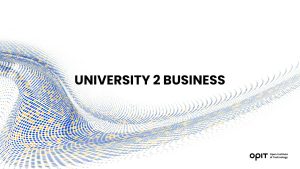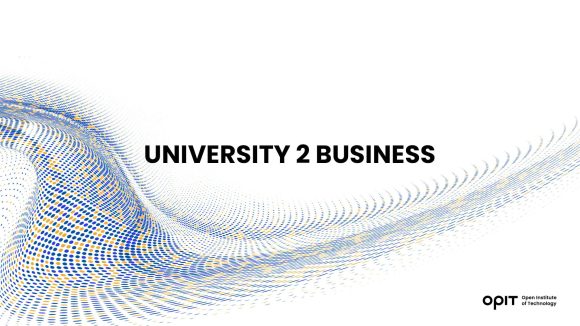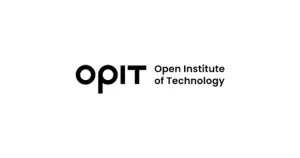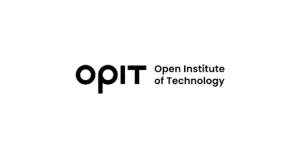

It’s not uncommon to hear stories from people who have committed several years to obtaining a university degree, only to discover it doesn’t fit the purposes they need when entering the business world.
Why? Even though universities spend years developing their degree courses in areas such as economics, business, and biomedical science, it is challenging to keep up with the latest technological advancements due to the lengthy approval process and a lack of experts on staff.
Today, artificial intelligence (AI), big data, cloud computing, and cybersecurity are beginning to impact every aspect of our business lives, regardless of whether you work in a cutting-edge science lab or an antiquities museum. However, many graduates fail to leverage this new technology and adapt it to their careers.
This is why OPIT – the Open Institute of Technology – was born, to offer affordable and accessible courses that bridge the gap between what is taught in traditional universities and what the job market requires.
How Is the Job Market Changing?
According to the World Economic Forum’s Future of Jobs Report 2025, 92 million jobs will be displaced by new technologies, though 170 million new jobs will be created that utilize new technology.
The report suggests that 39% of the key skills required in the job market will change by 2030. These include hard technical skills and the soft skills needed to work in creative environments where change is a constant.
New job descriptions will look for big data specialists, fintech engineers, and AI and machine learning specialists. Additionally, employers will also be seeking creative thinkers who are flexible and agile, as well as resilient in the face of change.
Technology-focused jobs that are in increasing demand include:
- Machine Learning Engineer – Developing and refining algorithms that enable systems to learn from data and improve performance.
- Natural Language Processing Specialist – Developing chatbots that can understand users, communicate naturally, and provide valuable assistance.
- AI Ethicist – Ensuring that AI is developed and deployed with broader social, legal, and moral implications considered.
- Data Architect – Gathering raw data from different sources and designing infrastructure that consolidates this information and makes it usable.
- Chief Data Officer – Leading a company’s data collection and application strategy, ensuring data-driven decision-makers.
- Cybersecurity Engineer – Building information security systems and IT architecture, and protecting them from unauthorized access and cyberattacks.
Over the next few years, we can expect most jobs to require an understanding of the applications for cutting-edge technology, if not how to manage the technical backend. Leaders need to know how to implement AI and automation to save time and reduce errors. Researchers need to understand how to leverage data to reveal new findings, and everyone needs to understand how to work in secure digital environments.
The conclusion is that in tomorrow’s job market, workers will need to find the right balance of technical and human skills to thrive.
A New Approach to Learning Is Needed
Learning requires a fundamental change. Just as businesses need to be adaptable, places of higher learning need to be more adaptable too, keeping their offerings up-to-date and reducing the timescales required to accredit and deliver new courses fit for the current job market.
This aligns with OPIT’s mission to unlock progress and employment on a global scale by providing high-quality and affordable education in the field of technology.
How Does OPIT Work?
OPIT is accredited with the MFHEA (Malta Further and Higher Education Authority) in accordance with the European Qualifications Framework (EQF).
Working with an evolving faculty of experts, OPIT offers a technological education aligned with the current and future career market.
Currently, OPIT offers two Bachelor’s degrees:
- Digital Business – Focuses on merging business acumen with digital fluency, bridging the strategy-execution gap in the evolving digital age.
- Modern Computer Science – Establishes 360-degree foundation skills, both theoretical and applicative, in all aspects of today’s computer science. It includes programming, software development, the cloud, cybersecurity, data science, and AI.
OPIT also offers four Master’s degrees:
- Digital Business & Innovation – Empowers professionals to drive innovation by leveraging digital technologies and AI, covering topics such as strategy, digital marketing, customer value management, and AI applications.
- Responsible Artificial Intelligence – Combines technical expertise with a focus on the ethical implications of modern AI, including sustainability and environmental impact.
- Enterprise Cybersecurity – Integrates technical and managerial expertise, equipping students with the skills to implement security solutions and lead cybersecurity initiatives.
- Applied Data Science & AI – Focuses on the intersection between management and tech with no computer science prerequisites. It provides foundation applicative courses coupled with real-world business problems approached with data science and AI.
Courses offer flexible online learning, with both live online-native classes and recorded catch-up sessions. Every course is hands-on and career-aligned, preparing students for multiple career options while working with top professionals.
Current faculty members include Zorina Alliata, principal AI strategist at Amazon; Sylvester Kaczmarek, AI mentor and researcher at NASA; Andrea Gozzi, head of Strategy and Partnership for the Digital Industries Ecosystem at Siemens; and Raj Dasgupta, AI and machine learning scientist at the U.S. Naval Research Laboratory.
OPIT designs its courses to be accessible and affordable, with a dedicated career services department that offers one-on-one career coaching and advice.
Graduating From OPIT
OPIT recently held its first graduation ceremony for students in 2025. Students described their experience with OPIT as unique, innovative, and inspiring. Share the experience of OPIT’s very first graduates in the video here.
If you are curious to learn more about the OPIT student community, OPIT can connect you with a current student. Just reach out.
Related posts


Source:
- Il Sole 24 Ore, published on June 23rd, 2025
At its core is a teaching heritage made up of 131 courses, 3,500 hours of video, 1,800 live sessions
Have questions?
Visit our FAQ page or get in touch with us!
Write us at +39 335 576 0263
Get in touch at hello@opit.com
Talk to one of our Study Advisors
We are international
We can speak in:


